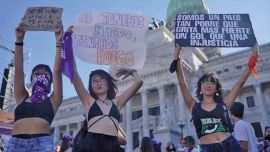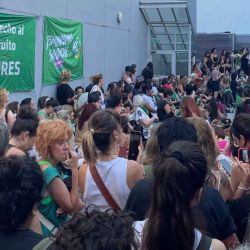In the face of government threats to erode women’s rights, feminists in Argentina are preparing to rally on International Women’s Day.
For this year’s edition of ‘8 de Marzo,’ activists will voice their long wishlist of national struggle. Protesters are particularly concerned about issues related to the gender pay gap, the threat to abortion rights, systemic poverty and gender-based violence – problems they feel have been exacerbated since the arrival of President Javier Milei in office.
Argentina’s new administration has already moved to close a key government ministry dedicated to gender and diversity issues, and La Libertad Avanza lawmakers last month submitted a bill to repeal Argentina’s abortion law. In landmark speeches, Milei himself has spoken out against “radical feminism” and branded abortion “a tragedy.”
“This year, especially with the Milei government, the feminist agenda is long,” activist and lawyer Victoria Aguirre said in an interview. “Today we have a huge food emergency situation; there are women who cannot eat at home, and there are children who cannot eat.”
Aguirre, the national spokesperson for MuMaLá, a national feminist organisation, explained that over 70 percent of households in Argentina are predominantly run by women – most of whom do not have access to formal employment, higher education nor social security benefits. Women also experience a 25 percent wage gap, according to the NGO’s data, which only exacerbates the struggle to afford food and support children.
Elizabeth Gómez Alcorta served as Argentina’s former Women, Gender and Diversity minister from December 2019 and October 2022. The portfolio she led was shuttered by Milei almost immediately after the La Libertad Avanza leader took office.
In statements to the Times, the lawyer contended that the food crisis is an example of how gender inequality is structurally imposed through government policy.
Gómez Alcorta explained that “with the current government, the right to eat, the right to work, the right to health, the right to life, the right to have a roof over our heads,” is at stake for women. Meanwhile, she said that these struggles go hand-in-hand with fights “against gender-based violence, machismo violence and the enormous pay gaps that exist.”
“Feminists always work within two times,” said the former government official. “On the one hand, in the immediate, and on the other hand, with structural reforms. Gender violence is structural violence. Inequalities are structural.”
Mariela Belski, executive director of Amnesty International Argentina, said in a statement that the nation’s current economic crisis – which predates Milei’s government – has had an “undeniable… differentiated effect on women, who have been most impacted.”
Belski cited recent data from the Social Debt Observatory (ODSA) of the Catholic University of Argentina (UCA) showing that today, 62.9 percent of children and adolescents in the country are poor.
The campaigner argued that the Milei’s government’s imposition of some issues – such as the recent elimination of inclusive language from public administration and the criticism of human rights activists, “deviates from the central axis of public policies, which should be effectively directed towards addressing urgent problems affecting women and girls.”
MuMaLá, which stands for ‘Mujeres de la Matria Latinoamericana,’ operates in 21 provinces nationwide. Their services range from data collection and analysis about gender issues, on-the-ground support for women experiencing financial hardship or gender-based violence, political activism and education.
The Times spoke to Aguirre at one of three weekly assemblies leading up to ‘#8M’, which were intended to serve as discursive launchpads for the national protest next week. She alluded to the importance of intersectional feminism and speaking up for those who have the least.
“I am not the voice of the neighbourhood,” Aguirre said, regarding her work as a campaigner and spokesperson. “I’m going to be your voice until you can speak, because our job is for you to be able to speak, because nobody is going to represent you better.”
Belski also cited “alarming” data related to gender-based violence, explaining that a woman was murdered every 35 hours in Argentina during 2022. In more than half of cases, the perpetrator was a partner or ex-partner of the victim.
Research by Amnesty International shows that one in three women in Argentina suffer violence in their lifetime.
“Despite this, there is still no clear plan by the current government to prevent, punish and eradicate all forms in which violence against women and LGBTQ+ people manifests itself,” said Belski.
Aguirre affirmed that the Milei administration’s threat to repeal abortion rights cannot go unchecked. Argentina’s current law, known as the Voluntary Interruption of Pregnancy Law (IVE), was passed on December 30, 2020 and establishes the right of pregnant women to interrupt pregnancy up to 14 weeks of gestation.
The legislation also confirms the right to legal termination of pregnancy in cases of rape and danger to the life or health of the pregnant woman. However, a new bill submitted by La Libertad Avanza lawmakers would instead impose penalties for people who have abortions and the medical professionals who perform them.
Aguirre said that women did not achieve this right without “many years of struggle,” which the newest proposal leaves unrecognised.
“What we always say is, it is our right to choose,” Aguirre remarked. “It is the sexual freedom to choose to [be a] mother, or not to [be a] mother.”
For Gómez Alcorta, abortion will always be a societal necessity, whether it is carried out “clandestinely or legally.” Lack of access to the right to legal abortion puts women in unsafe health conditions.
The legal expert said she is also concerned with the Milei administration’s tendency to promote “reactionary” political agendas that may be culturally regressive.
“They have a longing, a romanticism, for much earlier times,” Gómez Alcorta remarked. “And what that leads to is everything from very small-scale issues, such as the prohibition of inclusive language by the State, to the destruction of public policies, such as a programme that provided economic, psychological, physical and social assistance to women [experiencing gender-based violence].”
From her point of view, access to resources for women, non-binary, transgender and gay and lesbian people is impeded by both political and cultural inequalities.
“In order to change [inequalities], it is necessary to put a brake on a system that reproduces and legitimises them,” Gómez Alcorta said.
Campaigners are ready to do just that: this Friday, they will take to the streets across Argentina, ready to stand up for their rights.



























Comments